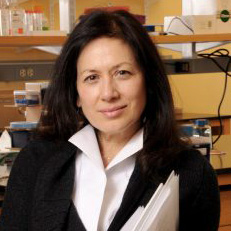Researchers at Dartmouth’s Geisel School of Medicine and Dartmouth-Hitchcock health system have been awarded up to $42 million to investigate environmental influences on child health. The highly competitive awards are part of a $157 million, seven-year initiative known as Environmental Influences on Child Health Outcomes (ECHO) that was announced today by the National Institutes of Health (NIH).
The ECHO program will study how exposure to a range of environmental factors in early development, from conception through early childhood, influences children and adolescent health. The awards will build the infrastructure and capacity for the ECHO program to support multiple, synergistic longitudinal studies that extend and expand existing cohort studies of mothers and their children.
“Every baby should have the best opportunity to remain healthy and thrive throughout childhood,” says NIH Director Francis Collins, MD, PhD. “ECHO will help us better understand the factors that contribute to optimal health in children.”
ECHO research will focus on factors that may influence health outcomes around the time of birth, as well as into later childhood and adolescence—including upper and lower airway health and development, obesity, and brain and nervous system development.

“Critical gaps remain in our understanding of the early drivers of child health and development that have life-long consequences,” explains Margaret Karagas, PhD, chair and professor of epidemiology at Geisel, who will collaborate closely with colleagues at Dartmouth College’s Arts and Sciences, Geisel, and Dartmouth-Hitchcock in the effort. “In particular, there is a dearth of comprehensive information on U.S. children, including those from rural settings who may experience higher exposures from unregulated drinking water supplies, household air pollution from wood smoke, and unique lifestyle factors influence by their physical environment.”
Led by Karagas, the New Hampshire Birth Cohort Study (NHBCS)—a research project that since 2009 has been investigating how various factors such as contaminants in the environment affect the health of pregnant women and their children in New Hampshire and Vermont—will receive up to $40 million in funding over the next seven years to help lead ECHO’s research efforts. “As a relatively young cohort, we are poised to apply advanced technologies to illuminate the impact of environmental toxicants, physical, social and behavioral factors, and medical exposures early in life that bear on lifelong health through this prestigious award,” she says.
The research team encompasses a diverse group of faculty members from across the Dartmouth campuses and includes: Drs. Juliette Madan and Margaret Guill (Pediatrics); Emily Baker (Obstetrics & Gynecology); Anne Hoen, Diane Gilbert-Diamond, and Modupe Coker (Epidemiology); Tracy Onega, Zhigang Li, and Eugene Demidenko (Biomedical Data Science); Lisa Marsch (Psychiatry); Brian Jackson (Earth Science), Tracy Punshon (Biology); Xun Shi and Jonathan Chipman (Geography), and talented staff members in the respective departments.
The NHBCS is one of a number of existing pediatric population studies being funded by ECHO as a consortium—ECHO’s goal is to enroll more than 50,000 children from diverse racial, geographic, and socio-economical backgrounds. These studies will analyze existing data, as well as follow the children over time to address the early environmental origins of at least one of ECHO’s health outcome areas. Each group will participate with the others to combine data that are collected in a standardized way across the consortium.
A critical component of ECHO will be to use the NIH-funded Institutional Development Awards (IDeA) program to build state-of-the-art pediatric clinical research networks in rural and medically underserved areas, so that children living in these communities are able to participate in clinical trials.

“This initiative will provide a much-needed central coordinating platform for pediatric clinical trials in the Dartmouth community,” says Paul Palumbo, MD, an infectious disease specialist at the Children’s Hospital at Dartmouth (CHaD) and a professor of pediatrics and of medicine at Geisel, who will receive up to $2 million in funding over the next four years to conduct pediatric clinical trials in NH as part of the IDeA States Pediatric Clinical Trials Network (ISPCTN). “It will support existing and new investigators, expanding our clinical trials universe, stimulating expansion of our portfolio and offering new opportunities for professional development with the resultant recruitment and training of new faculty and research staff.”
“As the state’s only children’s hospital, research is core to the mission of CHaD and its Department of Pediatrics,” explains Keith Loud, MD, MSc, chair and associate professor of Pediatrics at Geisel and physician-in-chief of CHaD. “The child health research unit that we will develop with this funding will not only connect us with clinical trials nationwide, but enhance our abilities to collaborate effectively with exciting research initiatives across Dartmouth, including Dr. Karagas’ ECHO program, Dartmouth SYNERGY Clinical and Translational Science Institute, and the emerging clinical research infrastructure at Dartmouth-Hitchcock,” says Loud.
In addition to its pediatric cohorts and clinical sites for the IDeA States Pediatric Clinical Trials network, ECHO’s infrastructure includes the following programmatic components: Coordinating Center, Data Analysis Center, Children’s Health and Exposure Analysis Resource Core, Patient Reported Outcomes Core, and Data Coordinating and Operations Center for the ISPCTN.
Funding for this research is supported by grants from the NIH Environmental Influences on Child Health Outcomes (ECHO) Program (grant numbers 1UG3OD023275-01 and 1UG1HD090877-01).
# # #
The Geisel School of Medicine at Dartmouth, founded in 1797, strives to improve the lives of the communities it serves through excellence in learning, discovery, and healing. The Geisel School of Medicine is renowned for its leadership in medical education, healthcare policy and delivery science, biomedical research, global health, and in creating innovations that improve lives worldwide.
Dartmouth-Hitchcock (D-H) is a nonprofit academic health system serving communities in northern New England. D-H provides access to more than 1,000 primary care doctors and specialists in almost every area of medicine at Dartmouth-Hitchcock Medical Center; the Norris Cotton Cancer Center, the Children’s Hospital at Dartmouth-Hitchcock, four affiliate hospitals, 24 ambulatory clinics and through the Visiting Nurse and Hospice for VT and NH. The D-H system trains nearly 400 residents and fellows annually, and performs world-class research, in partnership with the Audrey and Theodor Geisel School of Medicine at Dartmouth and the White River Junction VA Medical Center.